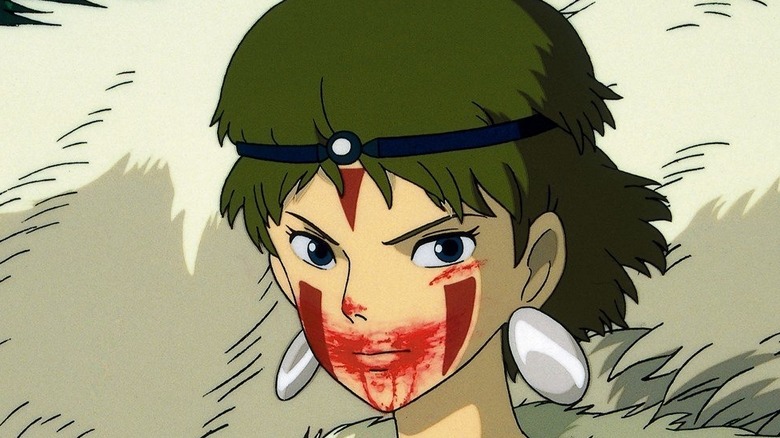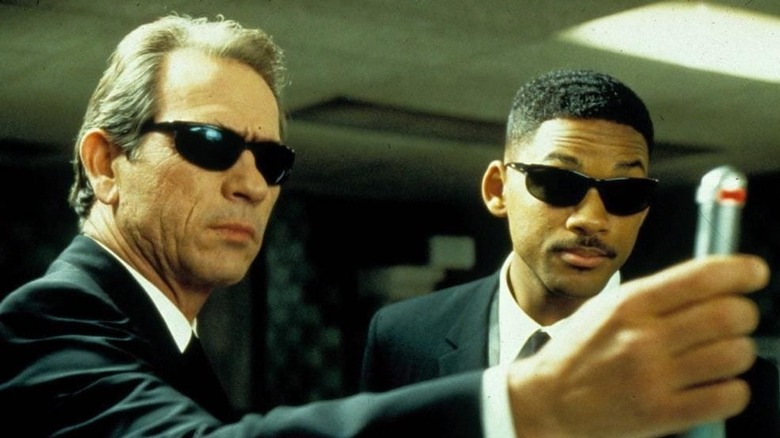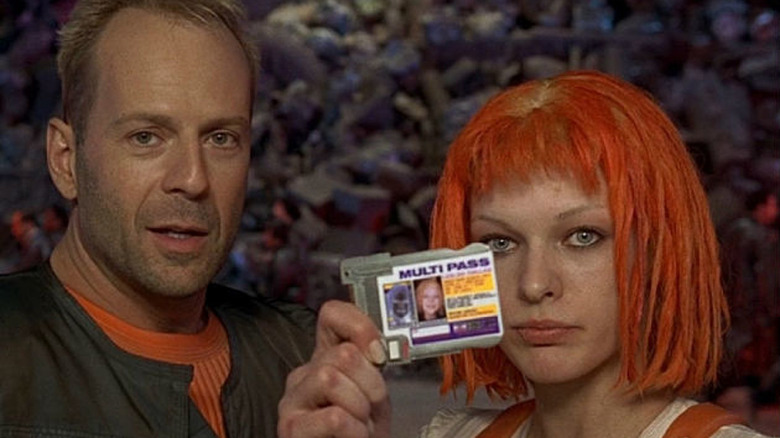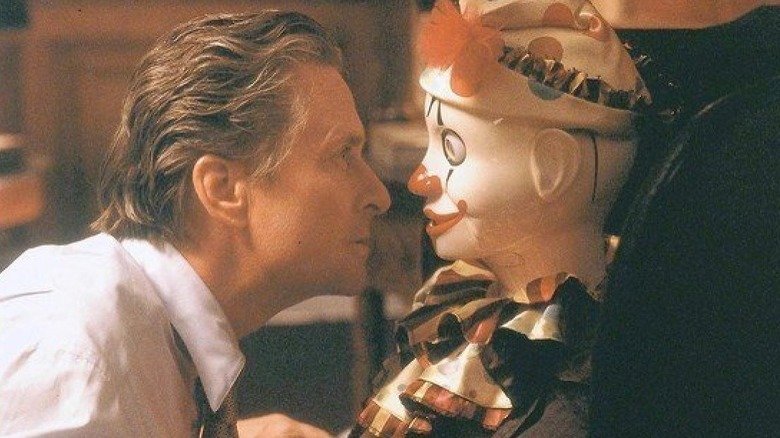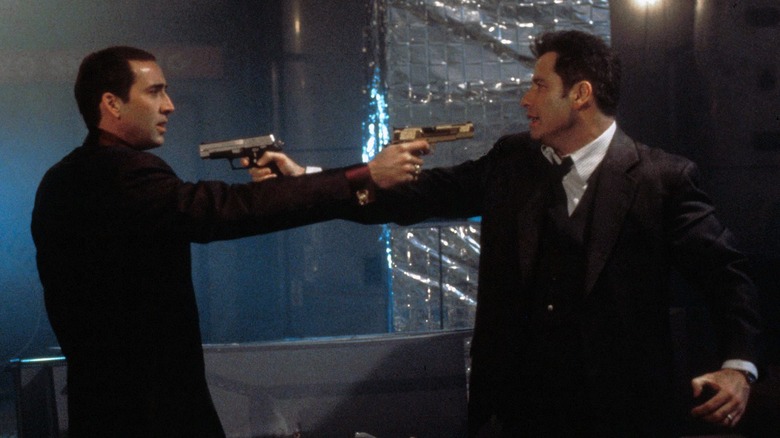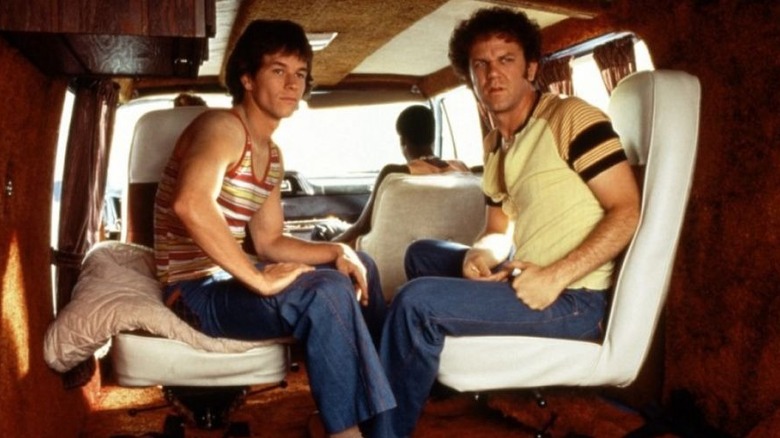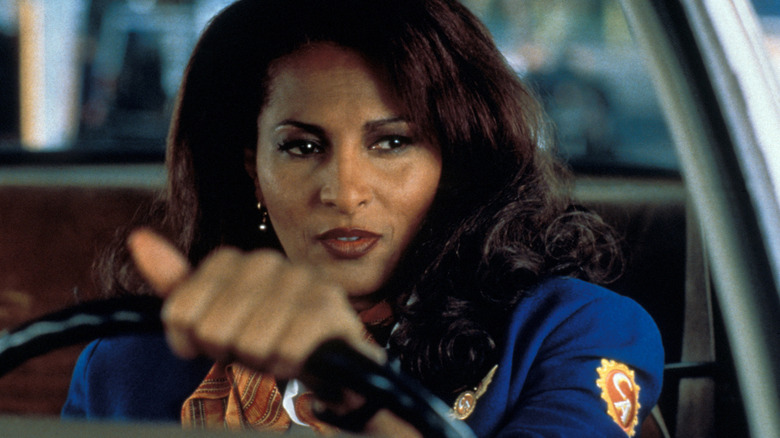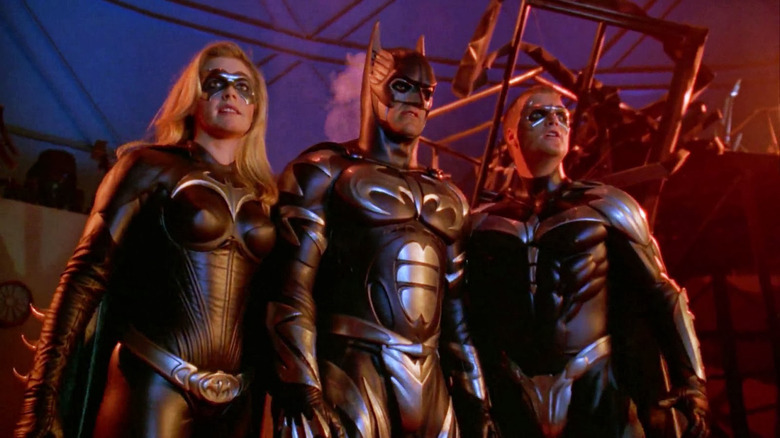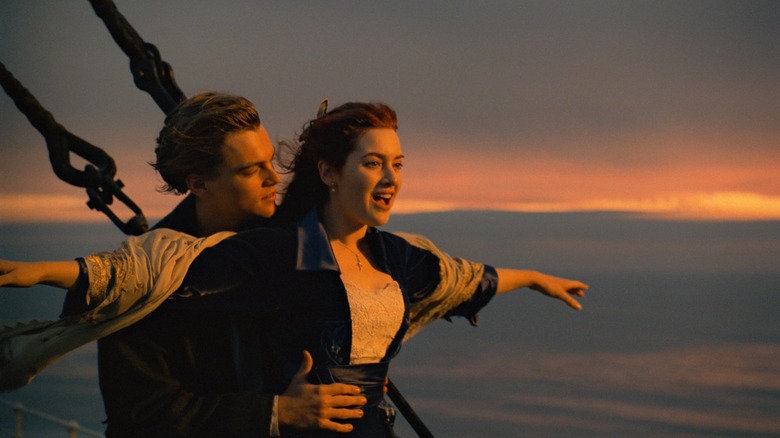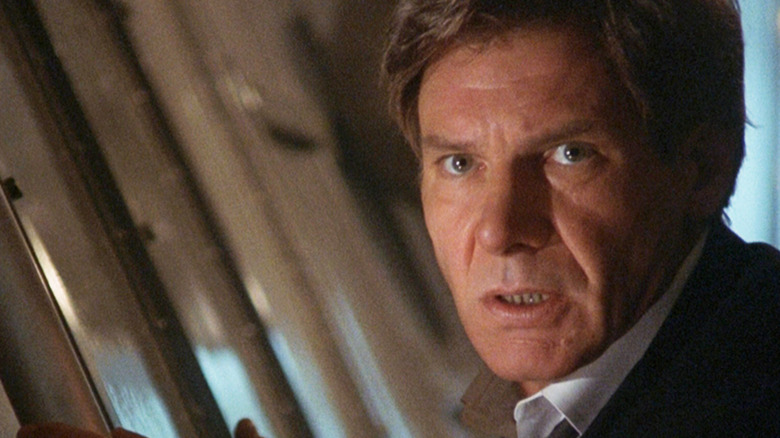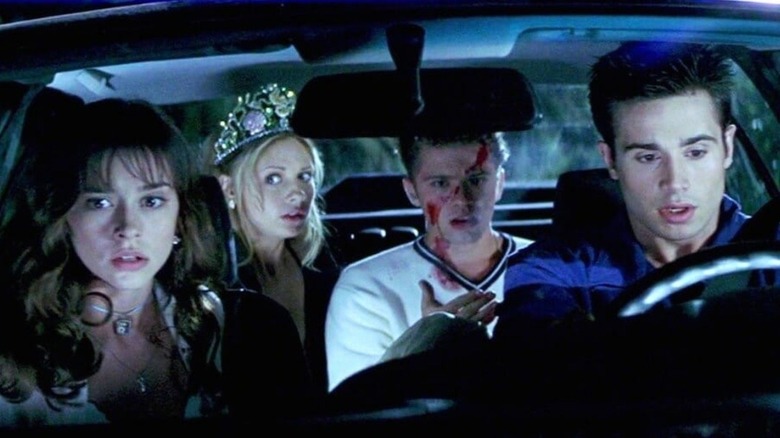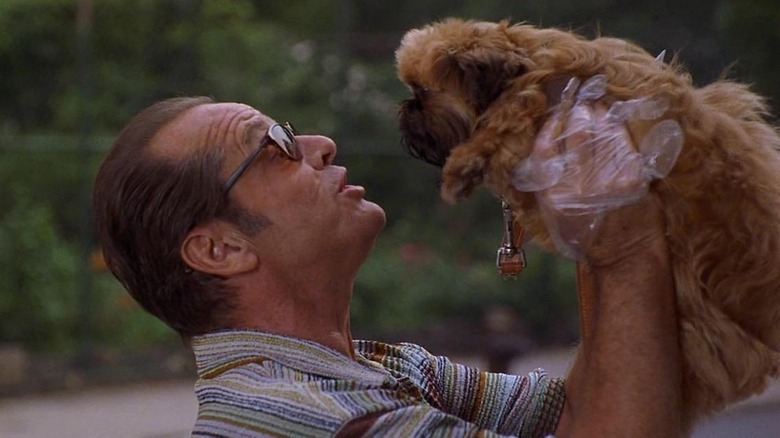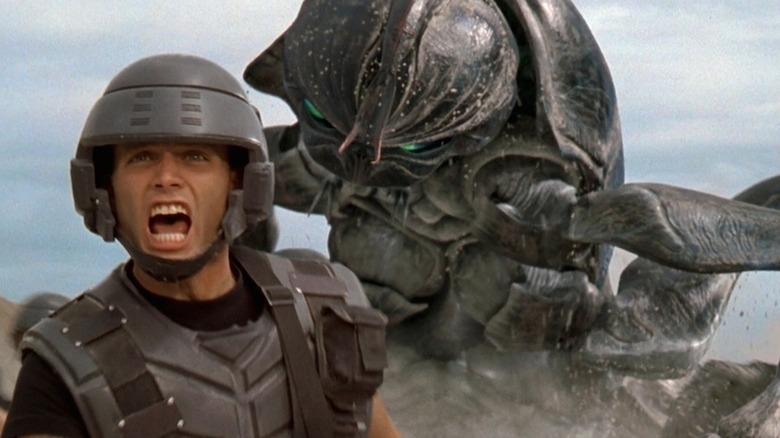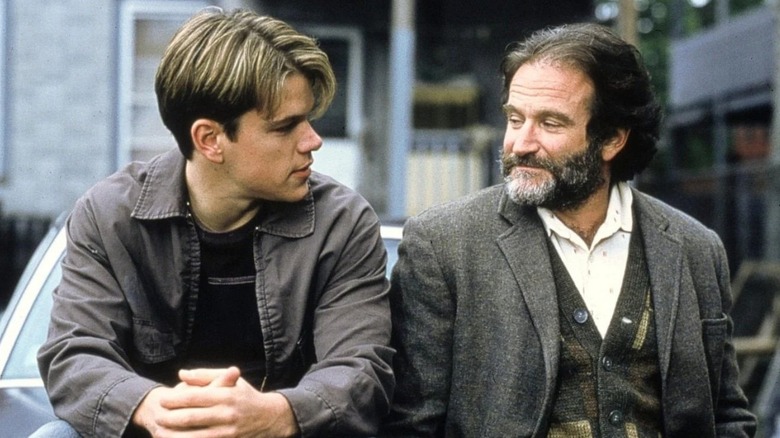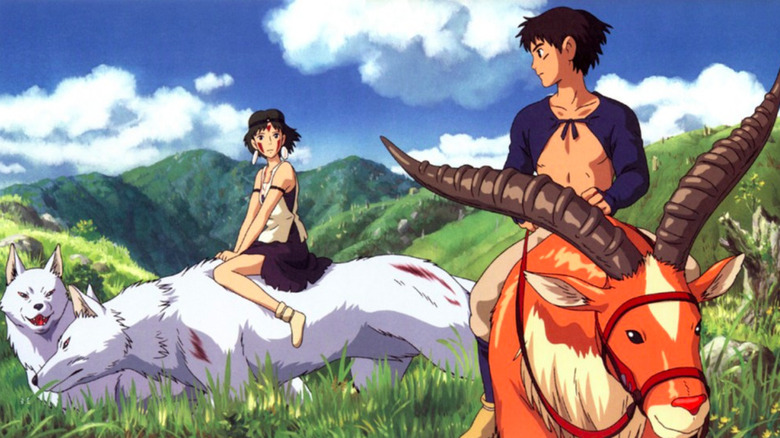Movies That Are Turning 25 In 2022
With 2022 in full swing, 1997 has officially turned 25. The year that saw the release of the first "Harry Potter" book and the most mediocre Metallica album is now old enough to rent a car without paying those annoying fees, suffer from chronic lower back pain (you're not a teenager anymore), and anxiously try to find a job with health insurance before getting kicked off its parents' plan. Also, a bunch of classic movies are turning 25 in 2022. From influential sci-fi classics to award-winning dramas and iconically bad superhero blockbusters, movie theaters hosted a wide range of films in 1997. It was a banner year for cinema, with several of its biggest releases remaining major cultural touchstones today.
As these films have now been around for a quarter of a century, it's a perfect time to return to the ones that hold up and acknowledge the ones that may not. Some of 1997's biggest films have proved to be timeless, while others have fallen victim to the leaps and bounds the industry has taken over the last two and a half decades. Here are some of the biggest movies turning 25 in 2022.
Men in Black
Will Smith, Tommy Lee Jones, neuralyzers, alien goo — "Men in Black" is an absolute classic, and it holds up great 25 years later. While the special effects may look a bit dated by today's standards, the old-school alien aesthetic gives the whole film a timelessly retro quality that's kept viewers coming back to it year after year.
The "Men in Black" franchise may not currently be at its peak, with 2019's "Men in Black: International" receiving a dismal 23% rating on Rotten Tomatoes, but returning to the original film immediately reminds viewers why it became such an institution. It's funny, charming, and it doesn't take itself too seriously. And of course, the whole movie is buoyed by the spectacular onscreen chemistry between Will Smith and Tommy Lee Jones. Smith in particular is at the rise of his movie stardom in "Men in Black," bringing the film an x-factor that few actors in any era can match. It's that beautiful zone when the Fresh Prince was transitioning from a TV sensation to one of the biggest stars in Hollywood, and his performance as Agent J foreshadows the box office juggernaut he would become.
"Men in Black" grossed almost $600 million upon release, working with a budget of less than $100 million (via The Numbers). It was a huge success, and retrospective viewings clearly show why. At the end of the day, it's just a fun time.
The Fifth Element
Science fiction was big at the box office in 1997. Though it was less of a box office success than "Men in Black," Luc Besson's "The Fifth Element" left its own indelible mark on the genre as well. Starring Bruce Willis, Milla Jovovich, Gary Oldman, and Chris Tucker in a show-stopping cameo role, the film paints a wild, colorful, and psychedelic vision of the future. If "Men in Black" is intentionally campy, "The Fifth Element" is straight-up weird. The characters look and talk in a way that's both distinctly otherworldly and, at times, rather jarring.
"The Fifth Element" has always been a divisive film — The Guardian's 20th anniversary review raised the question of whether it is a "gender-bending sci-fi or sexist space shambles" — but its bold style and groundbreaking visual effects have undeniably been influential in the decades since its release. It was a huge launching platform for Milla Jovovich's action movie career, and Tucker's turn as Ruby Rhod is one of the most memorable performances of the decade, even though it's only a small part of the film. Does "The Fifth Element" hold up in 2022? That largely depends on the viewer. It was a bit bizarre in 1997, and it remains bizarre now, but there's an undeniable spectacle to the whole thing that makes it worth revisiting.
The Game
David Fincher was hot in 1997, coming off the critical and commercial success of "Se7en" just two years prior. He would soon leap to even greater heights with "Fight Club" in 1999, but in between those two absolute classics, Fincher directed "The Game" — a psychological thriller starring Michael Douglas and Sean Penn.
"The Game" has all the trappings of the high-budget thrillers that reigned supreme in the late 1990s and early 2000s. As this article in Little White Lies suggests, the whole premise of the film compels viewers to question what's real and what's staged in every scene, as Douglas' Nicholas Van Orton tries to discern the nature of the titular game his mysterious brother (Penn) has signed him up for. Even by today's standards, "The Game" looks and sounds good, and there's a mania to the film's pacing that keeps tensions high and viewers engaged from start to finish.
Unfortunately, modern viewings of "The Game" highlight some of the sloppiness in the film's script — as per the Hartford Courant, there are plot holes that are explained away with the all-encompassing game concept and an expectation that viewers won't think about the whole thing too hard. The problem is that "The Game," like many of Fincher's films, demands that you think hard about everything that happens. Retrospectively, the movie's cracks show far more egregiously, and with so many neater thrillers and better films from Fincher, there isn't much reason to return to "The Game," even for the 25th anniversary.
Face/Off
Remember how "Men in Black" uses camp as an intentional style choice, harkening back to pulp sci-fi of the 1950s and 1960s? "Face/Off" is the other kind of camp — the so-absurd-it's-amazing and this-is-incredibly-stupid-but-I-love-it kind.
Starring John Travolta and Nicolas Cage, "Face/Off" is ostensibly a game of cat and mouse between an FBI agent (Travolta) and a ruthless killer (Cage). But as the title implies, things start to veer into ridiculous territory when the two lead characters undergo a face and voice swap with each other. It's a silly concept that somehow plays surprisingly well and earned the film high acclaim from the likes of Roger Ebert upon its initial release ("Face/Off" also holds an impressive 92% on Rotten Tomatoes).
Objectively, there is a lot to applaud about "Face/Off." Travolta and Cage are a genuine joy to watch as both characters, showing off their capacities for both more grounded acting and completely over-the-top hysteria. Director John Woo's action chops are also on full display, providing loads of thrills, explosions, and exciting fights, all shot beautifully. Whether you're watching it unironically as an action movie or just for the ridiculousness of the plot, "Face/Off" never fails to entertain, even 25 years after its premiere.
Between "Face/Off" and the similarly beloved "Con Air," 1997 was a big year for Nicolas Cage.
Boogie Nights
Paul Thomas Anderson's "Boogie Nights" is a full-frontal portrait of the American adult film industry in the 1970s and 1980s. It's loud and raunchy in all the ways that pitch implies, but it's also an excellently told story of vice and excess that received high praise upon its 1997 release (via Variety). "Boogie Nights" is the film that launched Anderson to the directorial fame that led to future hits like "There Will be Blood," "The Master," and "Phantom Thread." It also established Mark Wahlberg as a marketable movie star, even though he has since lamented his involvement in the film, according to IndieWire.
The saga of fictional adult film star Dirk Diggler (Wahlberg) certainly holds the high production quality that Anderson has become known for, and it delivers fabulous performances from the star-studded cast of Burt Reynolds, Julianne Moore, Don Cheadle, John C. Reilly, William H. Macy, and Philip Seymour Hoffman, among others. "Boogie Nights" may have been a bit outshined by Anderson's later work, but it still holds up.
Jackie Brown
"Pulp Fiction" is unquestionably one of the biggest films of the 1990s, not least because it launched Quentin Tarantino into the pantheon of elite Hollywood directors, where he's remained ever since. In 1997, he followed up his noir-inspired crime anthology with another story of underworld betrayal and intrigue. Starring Pam Grier as the titular character, "Jackie Brown" has never attracted the same level of fame and reverence as later Tarantino movies like the "Kill Bill" saga and "Django Unchained." However, it still has everything that fans of the director have come to love about his work, featuring a phenomenal cast including Samuel L. Jackson (of course), Robert Forster, Bridget Fonda, Michael Keaton, and Robert De Niro.
From the sharp dialogue to the strong directorial style, "Jackie Brown" is just as well-made and compelling as Tarantino's better known films, but how does it hold up 25 years after the fact? In part, that depends on your current view of Tarantino himself. Even at the time, "Jackie Brown” received critiques for its heavy vulgarity, especially its repeated use of the n-word, from major industry figures like acclaimed director Spike Lee (via TheThings). At this point, it's become clear that language of that kind is a signature of Tarantino's work. Some viewers will agree with Lee that it's egregious, while others may side more with Samuel L. Jackson, who has defended Tarantino's scripts, per IndieWire.
No matter what you think of Tarantino, though, Pam Grier is exceptional here.
Batman & Robin
Not every major movie from 1997 can be a hit, right? By all reasonable metrics, "Batman & Robin" should have been one of the biggest blockbusters of the 1990s. It starred George Clooney during his meteoric rise to Hollywood superstardom, alongside the likes of Arnold Schwarzenegger and Uma Thurman, and it came fresh off of three widely successful "Batman" films earlier in the decade. However, lightning did not strike a fourth time, and "Batman & Robin" is remembered mostly as a colossal failure, with its lead telling People it's a film he doesn't want to show his wife so she'll "have some respect for [him]."
From Clooney's nippled Batsuit to Schwarzenegger's comically over-the-top performance as Mr. Freeze, there's just too much worth making fun of in "Batman & Robin" for anyone to take it seriously. The jokes are cringey, the props are silly, and the whole tone feels wildly ill-conceived. This is the movie that effectively killed the "Batman" film franchise until Christopher Nolan eventually resurrected it with "Batman Begins," according to Bomb Report.
Is it worth returning to "Batman & Robin" for the 25th anniversary? To laugh at its expense, absolutely. For any other reason, probably not.
Titanic
1997 played host to a cavalcade of spectacular (and spectacularly bad) films, but there's a clear choice when talking about the biggest movie of the year, and that's James Cameron's "Titanic." More than that, it's one of the biggest movies of all time. When "Titanic" finished its initial theatrical run, it had shattered all box office records, grossing close to $2 billion — a figure it would exceed with later returns to the big screen (via The Numbers). It was nominated for 14 Academy Awards and won 11 of them, including the award for best picture. And at a reported budget of $200 million, it was the most expensive movie ever made at the time of its release.
"Titanic" would not be toppled from its gold-medal-spot atop the box office charts until Cameron's "Avatar," but it's a film that will live forever in the history books of cinema for its cultural impact alone. "Titanic" showed that huge budgets can yield huge returns, and the decades since have seen many studios follow its blueprint. As a film, it still holds up pretty well. Leonardo DiCaprio and Kate Winslet capture a classic kind of movie magic with their love story, and though the film might go on a bit longer than it needs to, it perfectly captures the building sense of dread and disaster implicit to the source material.
Once is probably enough when it comes to watching "Titanic," but it's still a classic in 2022 for anyone who hasn't seen it.
Air Force One
The 1990s saw the release of several "Die Hard"-inspired action movies — films where, typically, an isolated protagonist has to fight back against a villainous group in a relatively confined space. This subgenre includes movies like Steven Seagal's "Under Siege," Sylvester Stallone's "Cliffhanger," and, in 1997, "Air Force One," starring Harrison Ford as the surprisingly combat-ready President of the United States.
Of all the "Die Hard" clones of the decade, "Air Force One" is probably the one that's remembered most fondly. It received strong reviews from outlets like The Hollywood Reporter upon its release, and it has definitive star power in the trifecta of Ford, Gary Oldman, and Glenn Close. Unfortunately, it doesn't hold up all that well in 2022. Returning to "Air Force One" today, the action scenes and whole premise of the movie feel pretty dated. The questionable physics of airplane depressurization and the delivery of laughable one-liners like "get off my plane" add a campy appeal to the film, but that's about the most appeal it has anywhere. If you're a fan of this particular era of action movies, give it a 25th anniversary watch, but otherwise you can probably pass this one up.
I Know What You Did Last Summer
1997 falls pretty far outside the golden age of slasher movies that stretched from the late 1970s into the middle of the 1980s, but there were still plenty of pulpy entries in the genre getting pumped out to theaters in the 1990s. One of the most commercially successful films in that category was "I Know What You Did Last Summer," which stars a quartet of late '90s icons in Jennifer Love Hewitt, Sarah Michelle Gellar, Freddie Prinze Jr., and Ryan Phillippe.
At the time, this young core cast had a lot of pop culture appeal, and the film did quite well at the box office as a result, earning $125 million on a small budget of just $17 million, according to The Numbers. But Roger Ebert and other critics' reviews didn't quite match up with the commercial appeal. "I Know What You Did Last Summer" is little more than a by-the-books slasher flick, and it misses some of the x-factor that makes the genre's best installments so much fun. Still, it remains a prime example of where popcorn horror was at the end of the '90s.
As Good as It Gets
Jack Nicholson had done it all by 1997 — noir detectives, deranged killers, comic book supervillains, and everything in between. But he was far from done as a lauded leading man in Hollywood, which he proved with his third Oscar win for "As Good as It Gets," per IMDb. Costar Helen Hunt also received the Academy Award for best lead actress, and the film was nominated for best picture but ultimately lost out to "Titanic." On a reported budget of about $50 million, according to The Numbers, "As Good as It Gets" became a major box office success, grossing over $300 million. Because of its stars and many accolades, the film is remembered as a classic of the 1990s.
Returning to it 25 years later, however, "As Good as It Gets" doesn't hold up as well as you might like. Nicholson's character is consistently racist, antisemitic, homophobic, and sexist in his behavior, and these bursts of hatefulness are troublingly paralleled with the portrayal of his OCD, via The Tech. While the film is meant to show the character's growth through his relationships with the other two main characters (Hunt and Greg Kinnear), there isn't much that actually changes. Rather, his "quirks" seem to be validated by his successful romantic relationship by the end of the movie, which is problematic to say the least. Add in a depiction of mental illness that feels a bit cartoonish by today's standards (via Film Stories), and this is one film that may be best left in the '90s.
Starship Troopers
Paul Verhoeven's entire career can be characterized as a series of hits and misses, and that was certainly his legacy in 1997. "Robocop" and "Total Recall" were both still in recent memory, but the director was coming off of the complete flop and widespread controversy of "Showgirls" in 1995. His next film, "Starship Troopers," would return to the science fiction realm where he'd found so much success, and while it may not have earned particularly high praise in its day, The New Yorker has recognized it as something of a cult classic in the decades since.
The enduring appeal of "Starship Troopers" is due to a few things. First and foremost, the satire that drives the film still plays quite well today. The various news clips of humanity's frighteningly fascist society — a world where criminal executions are televised and children are shown playing with guns happily in commercials — are at the same time funny, absurd, and unnerving. The film's special effects also hold up surprisingly well, showing why "Starship Troopers" was nominated for an Academy Award in that department.
1997 was a pretty big year for the science fiction genre as a whole, with a release slate that included "Event Horizon," "Gattaca," "Contact," "The Lost World: Jurassic Park," and "Alien: Resurrection." But even in that crowded landscape, "Starship Troopers" retains a lot of unique appeal.
Good Will Hunting
"Good Will Hunting" is a complicated film to return to in 2022. In the wake of producer Harvey Weinstein's deplorable history of abuse coming to public light, the film's uncomfortable undercurrents of misogyny and harassment have become more glaring, a discomfort explored in Esquire. "Good Will Hunting" is quietly homophobic. It doesn't pass the Bechdel Test. And it occasionally seems to glorify predatory behavior in men. There's no doubt that a lot about "Good Will Hunting" thankfully wouldn't fly if it were made today. But that's not the entirety of the film's legacy.
At its best, "Good Will Hunting" is a powerful look at men grappling with trauma that they lack the tools to work through. Robin Williams is electric, and there's an undeniable allure to the look and feel of the whole story. Maybe it's the hauntingly beautiful soundtrack filled with Elliot Smith's greatest hits. Maybe it's the quiet regality that Williams brings to the role of Sean Maguire. Maybe it's the totality of Gus Van Sant's impressive directorial vision. But it's something — something that has given "Good Will Hunting" a lasting appeal, even with the critical glasses that it must now be watched through.
Princess Mononoke
Hayao Miyazaki is arguably the greatest animated filmmaker of all time, and in 1997, he was at the height of his artistic success. The auteur had just made a string of acclaimed films that included "Castle in the Sky," "My Neighbor Totoro," "Kiki's Delivery Service," and "Porco Rosso," and in just a few years, he'd release the biggest hit of his career, "Spirited Away." But before that, Miyazaki delivered a stunning fantasy epic with 1997's "Princess Mononoke."
"Mononoke" has all the trademarks that Studio Ghibli had become known for over the previous decade — stunning animation, worldbuilding that pulls viewers in from the first shot, and a grand, fiercely human story with a lot of thematic depth. The tale of human greed and industrialism overtaking and destroying the natural world is even more relevant 25 years later than it was when "Princess Mononoke" first premiered, and the animation is absolutely timeless. This is still an absolute must-watch or rewatch for anyone interested.
In the years since "Princess Mononoke" was released, the film has been cited as a major influence on several prominent movies and TV series, including James Cameron's "Avatar" and shows like "Avatar: The Last Airbender" and "The Legend of Korra." With hyper-relevant themes and a gorgeously animated story, "Princess Mononoke" seems to have an almost immortal staying power, and it's certainly one of the best films of 1997.
